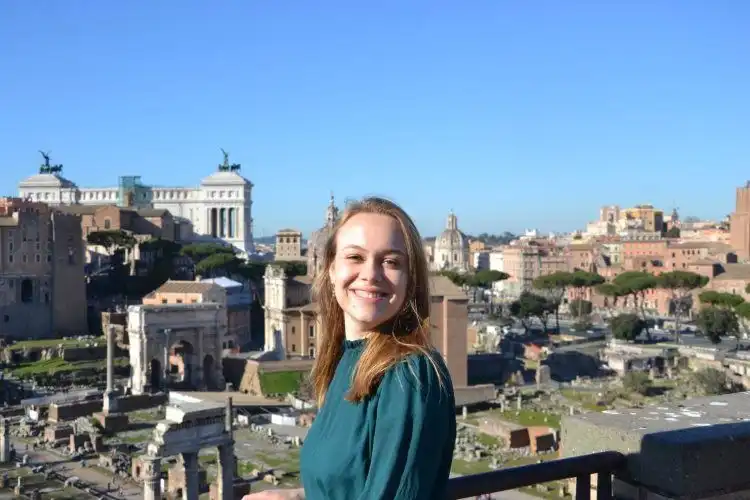Home>Emma, Junior Blue Carbon Consultant, EcoAct
21.09.2023
Emma, Junior Blue Carbon Consultant, EcoAct
Coming from France, Emma Lefebvre has graduated in Environmental Policy with concentrations in Diplomacy and Environmental Sustainability. She also completed a Master's degree in Marine Sciences with a specialization in Biological Oceanography and Marine Ecology at Aix-Marseille University.
Emma is Junior Blue Carbon Consultant in Nature and Technology-based Solutions at EcoAct, an international climate consultancy and project developer, in France.
What are your main responsibilities?
As a Junior Blue Carbon Consultant in the Project Development team, I work on projects related to Afforestation, Reforestation, and Revegetation, specifically focusing on intertidal and marine ecosystems like mangroves. I produce project descriptions in partnership with investors and local partners, particularly in India and Mexico. I manage these projects and ensure they adhere to international standards such as the International Carbon Reduction and Offset Alliance, and they are certified by Verified Carbon Standard and Climate, Community & Biodiversity Standards. I am in direct contact with local stakeholders, including NGOs, associations, and indigenous communities, to develop mangrove projects aimed at, for example, mitigating the impact of sea-level rise and climate change.
The most important skills required for this position include project management, multidisciplinary expertise encompassing marine ecosystems, partnership contracts, and business plans, proficiency in intercultural communication to engage effectively with diverse languages and cultures, diligence in delivering reports and presentations, and curiosity, as blue carbon projects are new and rapidly evolving.
How did you prepare for this job?
I prepared for this job through my personal employment and internship experiences, which I pursued alongside my seven years of studies. It was during my fieldwork as an oceanographer and research assistant in marine biology, as well as my travels to over 34 countries, that I realized the importance of the ocean for local communities, businesses, and humanity. I built my personal network by working in research laboratories, public ministries, and volunteering.
Sciences Po provided me with the opportunity to complete two internships: one at the General Secretariat of the Sea in the Prime Minister's Office and another at the Ministerial Delegation for Agri-Food Enterprises at the Ministry of Agriculture in France. I also spent a semester studying international security, law and economic diplomacy in Kenya. Upon my return to Paris, I secured my first permanent position in a foundation to develop their environmental strategy, all while pursuing my master's degree.
My academic advisors at Sciences Po always had faith in my ability to manage my workload, combining jobs, internships, and coursework, and the career services department supported me in my efforts to secure my first two permanent positions.
What is the most fascinating part of your job?
The most extraordinary part of my job is concretely developing mangrove restoration projects with local communities in need and witnessing the evolution of these plantations on the ground. At EcoAct, investors not only choose to invest in carbon offset projects but also in projects that engage local communities, empower them, and consider biodiversity within the entire ecosystem.
I have documented hundreds and thousands of terrestrial, intertidal, and marine species in reserves in places like the Yucatan in Mexico, the Sundarbans in India, and the coast of Guinea. I am always amazed to discover new and extraordinary species. All these species are documented, their endangered status assessed, and they are a fundamental pillar of my projects. As a marine biologist, it's a pleasure to see that the environment and biodiversity are not constraints to investments or projects but essential foundations for success. For someone passionate about international relations, it's a motivating challenge every day to engage with local communities in the field, understand their priorities and challenges, and make that a fundamental pillar of the projects. It's an exciting job where every day I wake up and think that I am in the right place, that I have found the perfect balance to make a real difference for the planet, biodiversity, and people, and that my work contributes to a better world.
How did your PSIA experience contribute to the position you hold today?
PSIA opens realms you may never have considered delving into. When I decided to enroll in Humanitarian and Political Diplomacy courses in the first semester, surrounded by students solely focused on humanitarian and security studies, I was the only one emphasizing that the environment is also a fundamental pillar in diplomacy. With no background in geopolitics beyond my personal knowledge, I feared that I might not measure up to the other international students and our exceptional teacher, Staffan De Mistura (Personal Envoy of the Secretary-General for Western Sahara, United Nations). However, I had the opportunity to present diplomatic challenges related to the ocean, participate in negotiation simulations, analyze the feminist psychology of heads of state, and ultimately graduated at the top of my class in Humanitarian and Political Diplomacy. This was the first time in my life that I had excelled in international diplomacy. It was at this moment that I realized I could go even further in fields I knew nothing about. PSIA gave me the opportunity to meet teachers with incredible and inspiring backgrounds who encourage us to get involved, believe in our abilities, and become role models.
What advice would you give to current students?
Be ambitious and determined. Dream big, set high and strong goals for yourself, and give yourself the means to achieve them. It requires an investment of time and energy, but if you find your passion, go all-in. Learn as much as possible, travel, meet people from all walks of life, be open-minded and rich in knowledge. Believe in yourself and feel legitimate. The ecosystem in which we live is evolving at an increasingly rapid pace, and it's not easy for our generation to keep up with it all, but we must leap even further ahead and take the reins. Be active participants in the world you live in. We are the future of our ecosystem.
